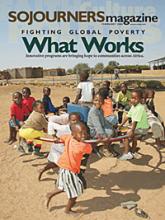A simple merry-go-round, propelled by children’s feet, is a playground staple that we remember from childhood. The Play-Pump, an ingenious product from Roundabout Outdoor, uses just two moving parts to channel the tireless energy of playing children into a well pump that fills a 30-foot-high tank.
Hundreds of Play-Pumps have been installed in South Africa and elsewhere, often right next to schools—giving children an added incentive to attend. The children get a delightful playground toy, and their fun helps to improve their families’ access to water. The only problem is convincing the kids to get off the Play-Pump when it’s time to go home.
Health begins with safe water. But in South Africa, the poor often live a mile or more from water sources. Risks of cholera and other diseases from contaminated water are high. Because many public hand pumps are placed directly over the borehole, spilled water can seep back in—often after contamination by animals. Most public water tanks are empty, and, even where electricity is available, the poor cannot afford the piping and power pumps used by the rich. So women and girls must spend tremendous time and energy trudging twice a day to draw water.
The suffering, vulnerability, and powerlessness of poverty are a daily reality for a staggering number of people worldwide. But in the last two decades, the share of the world’s people living on less than a dollar per day has fallen from almost two in five to one in five. Striking successes in developing countries’ public health include reductions in river blindness, polio, guinea worm disease, Chagas disease, and infant deaths due to diarrhea. Fertility has fallen dramatically in most developing countries.
Read the Full Article

